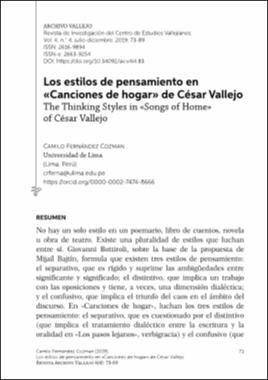Mostrar el registro sencillo del ítem
Los estilos de pensamiento en «Canciones de hogar» de César Vallejo
| dc.contributor.author | Fernández Cozman, Camilo Rubén | |
| dc.contributor.other | Fernández Cozman, Camilo Rubén | |
| dc.date.accessioned | 2019-09-30T18:41:31Z | |
| dc.date.issued | 2019 | |
| dc.identifier.citation | Fernández Cozman, C. (2019). Los estilos de pensamiento en «Canciones de hogar» de César Vallejo. Archivo Vallejo, 4(4), 73-89. https://doi.org/10.34092/av.v4i4.83 | es |
| dc.identifier.issn | 2616-9894 | |
| dc.identifier.uri | https://hdl.handle.net/20.500.12724/9181 | |
| dc.description.abstract | No hay un solo estilo en un poemario, libro de cuentos, novela u obra de teatro. Existe una pluralidad de estilos que luchan entre sí. Giovanni Bottiroli, sobre la base de la propuesta de Mijaíl Bajtín, formula que existen tres estilos de pensamiento: el separativo, que es rígido y suprime las ambigüedades entre significante y significado; el distintivo, que implica un trabajo con las oposiciones y tiene, a veces, una dimensión dialéctica; y el confusivo, que implica el triunfo del caos en el ámbito del discurso. En «Canciones de hogar», luchan los tres estilos de pensamiento: el separativo, que es cuestionado por el distintivo (que implica el tratamiento dialéctico entre la escritura y la oralidad en «Los pasos lejanos», verbigracia) y el confusivo (que evidencia la ruptura de la sintaxis y la presencia embrionaria de algunos rasgos vanguardistas en «A mi hermano Miguel», por ejemplo). | es_PE |
| dc.description.abstract | There is not a single style in a book of poems, book of stories, novel or play. There is a plurality of styles that fight each other. Giovanni Bottiroli, on the basis of Mikhail Bakhtin’s proposal, formulates that there are three styles of thought: separative, that is rigid and suppresses the ambiguities between signifier and meaning; the distinctive, that implies a work with the oppositions and has, sometimes, a dialectic dimension; and the confusive one, that implies the triumph of the chaos in the scope of the discourse. In «Songs of Home», the three styles of thoughts struggle: the separative that is questioned by the distinctive (which implies the dialectical treatment between writing and orality in «The distant steps», for example) and the confusing (that evidences the rupture of the syntax and the embryonic presence of some avant-garde features in «To my brother Miguel», for example). | en_EN |
| dc.language.iso | spa | |
| dc.publisher | Centro de Estudios Vallejianos | |
| dc.relation.ispartof | urn:issn:2616-9894 | |
| dc.rights | info:eu-repo/semantics/openAccess | * |
| dc.rights.uri | https://creativecommons.org/licenses/by-nc-sa/4.0/ | * |
| dc.source | Repositorio Institucional - Ulima | |
| dc.source | Universidad de Lima | |
| dc.subject | Crítica literaria | es_PE |
| dc.subject | Poesías peruanas | es_PE |
| dc.subject | Literary criticism | en_EN |
| dc.subject | Peruvian poetry | en_EN |
| dc.title | Los estilos de pensamiento en «Canciones de hogar» de César Vallejo | es_PE |
| dc.title.alternative | The Thinking Styles in «Songs of Home» of César Vallejo | en |
| dc.type | info:eu-repo/semantics/article | |
| dc.identifier.journal | Archivo Vallejo | |
| dc.publisher.country | PE | |
| dc.type.other | Artículo | |
| dc.subject.ocde | https://purl.org/pe-repo/ocde/ford#6.02.04 | es_PE |
| dc.identifier.doi | https://doi.org/10.34092/av.v4i4.83 |
Ficheros en el ítem
Este ítem aparece en la(s) siguiente(s) colección(ones)
-
Estudios Generales [83]



